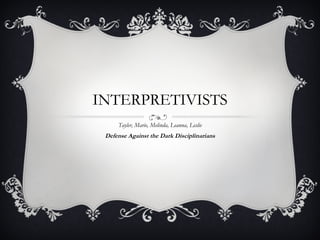Report
Share

Recommended
Recommended
More Related Content
What's hot
What's hot (20)
Interpretivist paradigm CTL 1018 - Lesely, Louisa, Noelle

Interpretivist paradigm CTL 1018 - Lesely, Louisa, Noelle
Viewers also liked
Viewers also liked (20)
Ontology, axiology and epistemology in the english curriculum

Ontology, axiology and epistemology in the english curriculum
Inductive and Deductive Approach to Research. Difference between Inductive an...

Inductive and Deductive Approach to Research. Difference between Inductive an...
Similar to Interpretivist
Similar to Interpretivist (20)
Theoretical or conceptual frameworks for dissertations or theses 2016

Theoretical or conceptual frameworks for dissertations or theses 2016
Seminar paper the grammar exercises of MICHAEL M. MAGBANUA, MA

Seminar paper the grammar exercises of MICHAEL M. MAGBANUA, MA
Today’s AgendaChapter 6 CultureMinute PollTopic 1 Cultur

Today’s AgendaChapter 6 CultureMinute PollTopic 1 Cultur
1. To be considered true research, a project mustA. gather togeth.docx

1. To be considered true research, a project mustA. gather togeth.docx
Interpretivist
- 1. INTERPRETIVISTS Tayler, Marie, Melinda, Leanna, Leslie Defense Against the Dark Disciplinarians
- 2. Interpretivists- Believe that: 1) The world is socially constructed 2) Social phenomena do not exist independently of our interpretation of them 3) Objective analysis is impossible Goals/Methods: 1) Since humans are intentional and self reflective, scholars should study attitudes over actions 2) Scholars should study people in their natural environment, seeking to understand rather than explain 3) Qualitative analysis is emphasized over quantitative analysis
- 4. Daniel Dennett: He comes up with strategies that one could adopt towards a system and specifically a chess playing computer. Three stances and strategies: 1) The design stance- to predict the computers behavior on the basis on what we know of its design 2) The physical stance- to base our predictions on the physical make-up of the machine 3)The intentional stance- to view the machine like an intelligent opponent. It’s treating the system as if it had propositional attitudes and looks for the language of beliefs and desires of the machine. EX: It may be said that the computer thinks it ought to get the queen out early *When predicting the moves of a chess playing computer neither one of the 2 stances would be of much use in practice because such machines are far too complicated.
- 6. 4. To identity the factors that have been contributed to the dev. of the problem over time Every problem has a history and Davidson based a lot of his work on what past philosophers had said about a problem like reasons behind actions. 5. To reveal the paths of prior disciplinary research and how the proposed interdisciplinary project is linked to these and may extend them It’s about analyzing prior qualitative approaches that other scholars have touched on so that they can keep that in mind in their own studies. 6. To situate or contextualize the problem It’s all about interrelationships, qualitative data and focusing on how people relate with one another via attitudes.
- 7. 7. To develop “adequacy” in the relevant disciplines Be open on how there may be other factors contributing to a person’s attitude or behavior. 8. To identify the defining elements Identifying how other researchers have different explanations for other’s behavior. It’s about looking at the same problem of behavior but considering other factors from other researchers. 9. To verify that the disciplines identified are relevant Yes, it is necessary to narrow down the applicable disciplines.